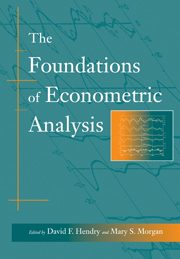Book contents
- Frontmatter
- Contents
- Preface
- Acknowledgements
- Introduction
- Bibliography
- I The Emerging Role of Econometrics in Economics
- II Early Time-Series Analysis
- III Applied Econometrics and the Identification Problem
- IV The Evolution of Statistical Thinking in Econometrics
- V Dynamic Models
- 27 Our Unstable Dollar and the So-Called Business Cycle (Journal of the American Statistical Association, vol. 20, 1925, pp. 181–91, 194–8)
- 28 The Notions of Horizon and Expectancy in Dynamic Economics (Econometrica, vol. 1, 1933, pp. 247–52, 259–64)
- 29 Propagation Problems and Impulse Problems in Dynamic Economics (in Economic Essays in Honour of Gustav Cassel, Allen & Unwin, London, 1933, pp. 171–3, 181–90, 197–203)
- 30 Statistical Testing of Business Cycle Theories: Business Cycles in the United States of America, 1919–1932 (League of Nations, Geneva, 1939, vol. II, pp. 13–20)
- 31 Statistical Estimation of Economic Relationships (read to the International Statistical Conferences, Washington, 1947. Proceedings published as a supplement to Econometrica, vol.17, 1949, pp. 6–9)
- 32 Prolegomena to a Pressure-Analysis of Economic Phenomena (Metroeconomica, vol. 1, 1949, pp. 135, 139–42)
- VI The Tinbergen Debate
- VII Structure and Simultaneity
- VIII The Probabilistic Revolution
- IX Exogeneity
- Index
32 - Prolegomena to a Pressure-Analysis of Economic Phenomena (Metroeconomica, vol. 1, 1949, pp. 135, 139–42)
Published online by Cambridge University Press: 05 June 2012
- Frontmatter
- Contents
- Preface
- Acknowledgements
- Introduction
- Bibliography
- I The Emerging Role of Econometrics in Economics
- II Early Time-Series Analysis
- III Applied Econometrics and the Identification Problem
- IV The Evolution of Statistical Thinking in Econometrics
- V Dynamic Models
- 27 Our Unstable Dollar and the So-Called Business Cycle (Journal of the American Statistical Association, vol. 20, 1925, pp. 181–91, 194–8)
- 28 The Notions of Horizon and Expectancy in Dynamic Economics (Econometrica, vol. 1, 1933, pp. 247–52, 259–64)
- 29 Propagation Problems and Impulse Problems in Dynamic Economics (in Economic Essays in Honour of Gustav Cassel, Allen & Unwin, London, 1933, pp. 171–3, 181–90, 197–203)
- 30 Statistical Testing of Business Cycle Theories: Business Cycles in the United States of America, 1919–1932 (League of Nations, Geneva, 1939, vol. II, pp. 13–20)
- 31 Statistical Estimation of Economic Relationships (read to the International Statistical Conferences, Washington, 1947. Proceedings published as a supplement to Econometrica, vol.17, 1949, pp. 6–9)
- 32 Prolegomena to a Pressure-Analysis of Economic Phenomena (Metroeconomica, vol. 1, 1949, pp. 135, 139–42)
- VI The Tinbergen Debate
- VII Structure and Simultaneity
- VIII The Probabilistic Revolution
- IX Exogeneity
- Index
Summary
The traditional approach to the analysis of the price formation process and of market phenomena in general is that the demand schedules and the supply schedules together determine the prices, so that, if both sets of schedules are assumed, it has no sense to ask what will happen if such and such a change in price occurs. If it is wanted to consider the effect of price changes in the traditional scheme, this effect must be looked upon only as a potential effect, say the effect that would be produced on the quantities demanded if the demand schedules remained unchanged while shifts (sufficient to produce the given price changes) occurred, in the supply schedules. Or vice versa. For many purposes it is more satisfactory to work with a theoretical scheme which is such that it is possible to assume at the same time a given demand and supply structure and still ask the question of how the quantities traded will react under the impact of price changes. An outline of – or rather prolegomena to – such a theory is given in this paper.
Such a modification of the traditional demand–supply set up seems particularly necessary for analytical purposes in international trade, and in what follows I shall most of the time speak about ‘countries’, ‘International trade’, etc. But the argument is general and has obvious applications to other parts of economic theory.
- Type
- Chapter
- Information
- The Foundations of Econometric Analysis , pp. 355 - 358Publisher: Cambridge University PressPrint publication year: 1995



